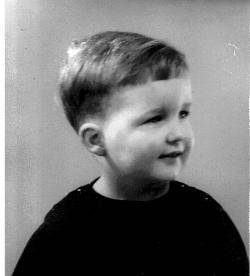I remember crying. I must have been six or seven when I read in the local rag that Purley, my hometown, was being amalgamated with Croydon, the next and bigger town. I felt the loss of something - my home - the separateness of it, the meaning of the name that was part of my identity - my home town. It hurt, and I remember crying. Now, I feel very little connection. Purley is a dreary middle-class sprawl, a characterless suburban nothing. I was born and brought up there, in that house look; you can just see it across the valley from the train. I used to always count the special brown and cream coaches of the Brighton Belle sitting at the kitchen table. I haven't been back in forty years, never wanted to.
When I was eleven I was sent to boarding school. We were supposed to write home at the weekend - that was the terrible thing about that school, all your life was supposed- I never had anything to say, except the thing I knew I wasn't supposed to say, which was "For God's sake get me out of this hell-hole''. School was no home, and home had sent me to school; I felt truly homeless, abandoned and alone. I ran away in the second term, terrified on unknown buses, travelling alone for the first time in my life, and eventually got back to the house. We had just moved - or rather they had just moved; I was at school - and I arrived late evening, dark, wet, and cold, in shock I suppose. All I could say was 'I didn't like it, so I came home...' standing in the living room, trying not to cry. They phoned the school, and took me back next day. My house-master had a little chat with me, and explained that I was just having a little adventure; nothing more would be said about it, on the understanding that it wouldn't happen again. So it didn't. What was the point, there was nowhere left to go. I've never really got over that time. I'm pretty much disconnected from my family; I've never felt really part of it since I suppose I'm a sort of refugee from the middle class and from the Home Counties.
I live in Wales as a foreigner and in a way I'm comfortable with that. It's a funny place, Wales; 'Welsh' is an English word meaning 'foreigner' and in some ways the place is defined negatively, as not being England. No one seems quite sure what it takes to be Welsh. You can be born here, live your life here, and still not quite fit in South Wales is another country to up here in the North; West Wales is more Welsh than the Marches (at least in the eyes of the West Welsh). Some people are, in their own words, 'Very Welsh'. Llandudno, where I live, is not Very Welsh, it's a tourist town and has been since it was built in Victorian times for presumably English holiday-makers. Even the time it was built is English - we appropriate everything in our arrogance. So even the locals are not altogether local for the most part, and in the season, there are all sorts come here, and all sorts are welcome if they have money to spend. Some people resent Llandudno as an English enclave in Wales, but although it's not entirely Welsh, it's not English either - there are too many churches and chapels for one thing. There's an air of nostalgia for a bygone age that probably never was, and a history that no one can quite lay claim to, from the Bronze Age Mines to the Alice in Wonderland Statue.
My favourite author, J. Krishnamurti, wrote that he felt at home everywhere. Feeling at home, he said, is feeling affection and feeling responsible for what is around you and what goes on. I have lived in other places, in Wales and elsewhere, and not felt like that, instead I've felt unwelcome, resented and an outsider. I'm very dependent on other people in that way, I think most of us are. Perhaps that's why I like to live here in a Victorian Wonderland, a foreigner in a foreign town in a country called foreign - I almost feel at home.
9 Jan 2007
Subscribe to:
Comments (Atom)

